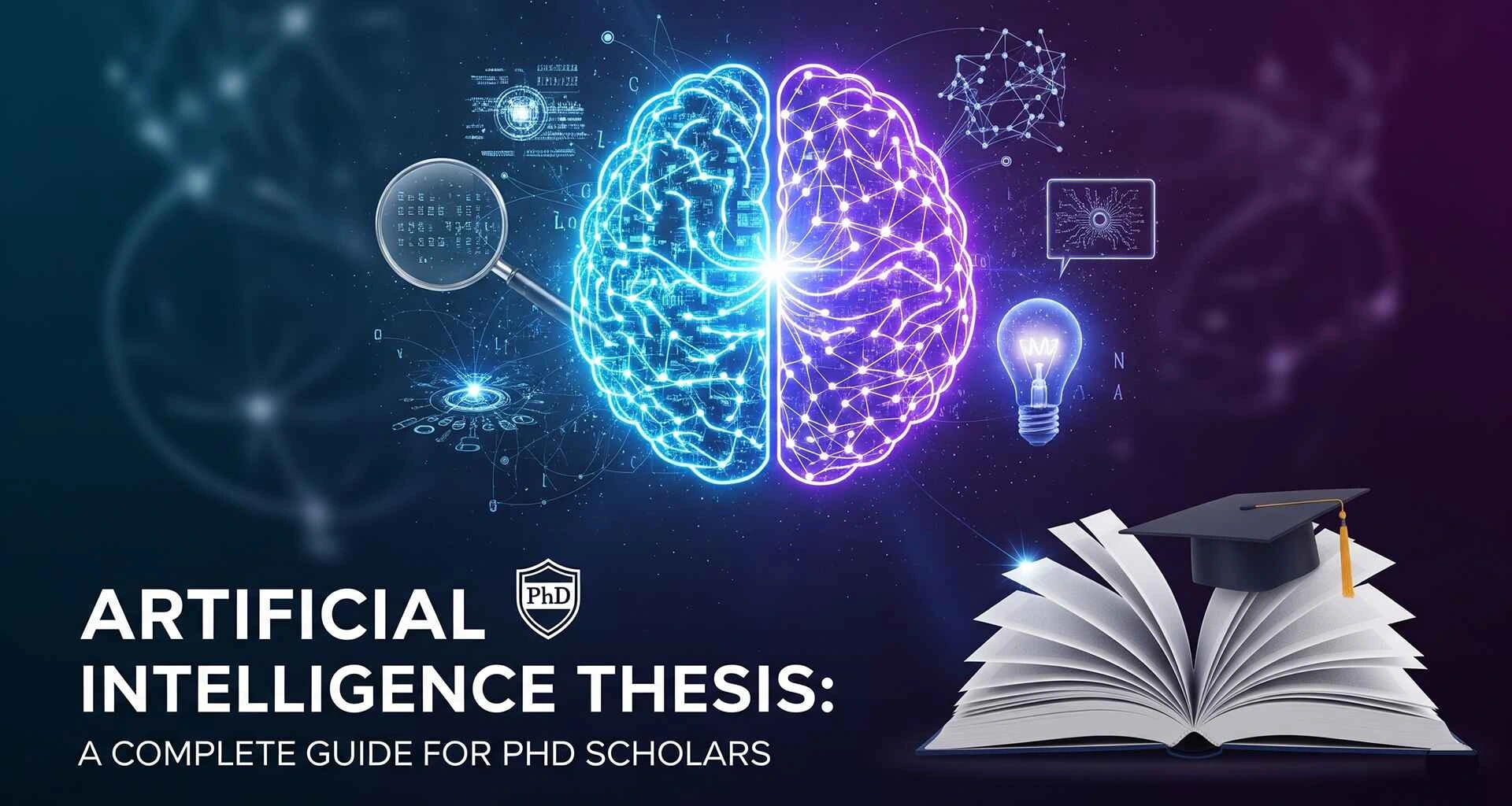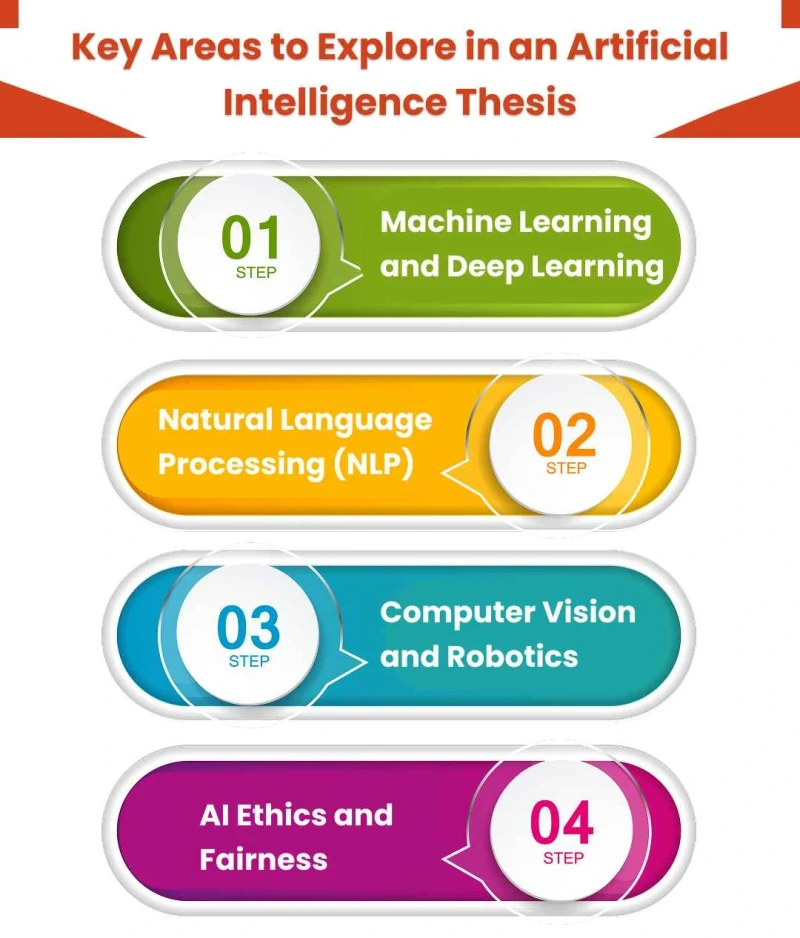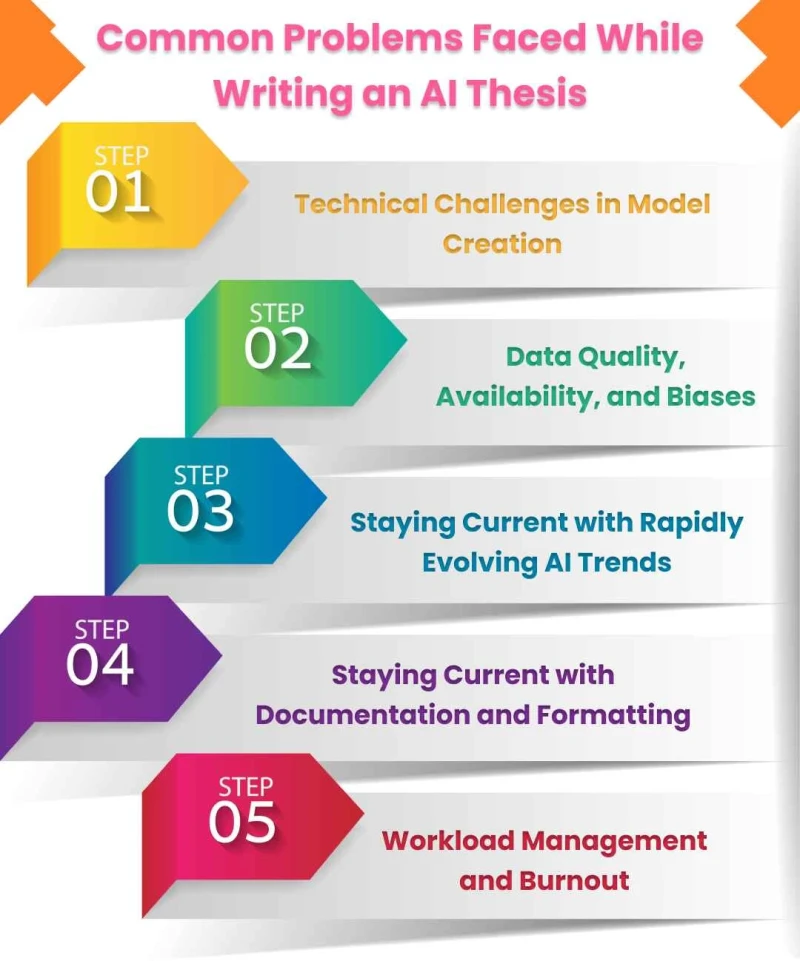Purposive Sampling in a Thesis: Don’t Write Without Reading This
Don’t write your methodology without reading this. Learn why purposive sampling is essential for case studies and how to define your inclusion criteria. Url:purposive-sampling

Esther. F
Crafting an artificial intelligence thesis for your PhD is not only an intellectual achievement; it is the start of a research journey that can help define technology's future. AI's broad scope brings together creativity, practical effect, and science at its peak. Yet students get confused between trendy and useful, and this is what might delay progress or lessen the quality of the thesis. This guide leads you through each key step.
We assist students around the world in developing compelling AI theses attuned to academic objectives and business needs. Whether you are beginning or editing your first draft, we can assist you through every process from topic choice to publication. Use our service to make your thesis process smooth, productive, and future-oriented.
An artificial intelligence thesis is a research-based document completed as part of a PhD program that dives deep into a specific problem within the field of AI. It demonstrates your ability to contribute original knowledge to the field and often results in new theories, models, or applications.
Unlike a general computer science thesis, an AI thesis focuses more on intelligent algorithms, data-driven models, and problem-solving with autonomy and learning capabilities. It demands stronger interdisciplinary knowledge, especially in statistics, data science, and cognitive science.

Choosing the most suitable area of study is the first crucial step in determining your artificial intelligence thesis. AI is a dynamic and extensive field with multiple areas that meet academic goals and business requirements. The significance is to ensure that your subject matter aligns with real-world applications and current research requirements. Below are four of the most popular and impactful areas you can opt for in your AI PhD program:
This is the basis of the majority of AI advancements in the present times. You can build models that learn from data, identify patterns, and make intelligent predictions in your thesis. Deep learning through the use of neural networks facilitates even more advanced uses, such as voice and autonomous technologies.
NLP is about making machines competent in understanding and responding to human language. Chatbots, language translation, text summarisation, or emotion detection are some of the topics for a thesis here. With growing AI-based communication, NLP is still a satisfying subject to research.
This domain involves learning how to make computers comprehend and read visual information. You can think in terms of facial detection, object identification, gesture recognition, or self-localisation. Robotics research also encompasses sensor-based real-world decision-making and motion planning.
The impact of AI on society renders this discipline both relevant and timely. In this area, your research could be focused on the detection of bias in data sets, making AI decision-making more transparent, or developing guidelines for the ethical deployment of AI. It's ideal for researchers who would like their thesis to be both technically advanced and socially responsible.
Studying any of these subjects can make a balanced and industry-orientated artificial intelligence thesis, which will make you notable both in the academic field and in your professional life in the future.
Selecting the correct topic for your artificial intelligence thesis is not just an initial step — it's the basis of your entire research. A poor or untargeted topic may result in a narrow scope, insoluble problems, or even project failure. Most PhD students find themselves too late when they find that their topic is not research-worthy in terms of academic substance, industry application, or data backing. This leads to lengthy timelines, effort wastage, and missed publication windows. To prevent this, critically assess your thesis idea with the following in mind:
Finding Gaps in AI Research
Aligning Personal Interest with Industry Relevance
Verifying Data Availability and Research Workability
A solid artificial intelligence thesis is not merely about original ideas, it's about how effectively those ideas are organised, researched, and presented.
A well-organised thesis consists of an abstract, introduction, literature review, methodology, results, discussion, and conclusion. Each one must logically follow from another, providing clarity for your work and making it easier for readers to follow the research process from beginning to end.
Your literature review must point to gaps in current research and provide a firm basis for your research. Methodology must be clearly stated so that your data sources, tools, models employed, and how experiments were planned and carried out are all understood.
Your results section should be crisp, data-laden, and readable. Utilise graphs, charts, and tables to illustrate findings. Describe trends and results in non-jargon language so that others can replicate or extend your work.

Writing an artificial intelligence thesis also has certain technical and individual problems. They are best defined in advance so that you can prepare and not waste time in the future. The following are some of the most frequent problems faced by PhD students:
Model building and tuning require A-grade coding skills. Algorithmic logic, training, or performance tuning errors typically slow progress significantly.
Finding clean, ethical, and balanced data sets is difficult. Poor-quality data can create biases, affect outcomes, and render your study less reproducible or credible.
PhD research is a long-distance run. Students are overwhelmed with time management, workload, and stress at the expense of late submissions or poor quality of work.
AI is an emerging field of study. What is modern today will be obsolete in a day. It is mentally exhausting and time-consuming keeping up while writing your thesis.
Paper and formatting to academic standards (journal submission level, especially) require patience, caution, and eloquence — often lost in projects involving massive coding.
Having a hard time overcoming such obstacles? Let our help at Ondezx. Our AI thesis experts walk you through technical obstacles, writing, and deadlines easily
In choosing the best topic to write an artificial intelligence thesis, you have to utilise the best tools. These tools help you develop good models, keep your research organised, and professionally produce your work. The following is the list of must-use tools and platforms that all artificial intelligence research scholars should be aware of:
Python is by far the most widely used language in artificial intelligence and machine learning research. It is easy to learn, possesses elegant syntax, and has massive libraries that can perform everything from data preprocessing to building advanced neural networks.
Irrespective of attempting algorithms, training a deep learning model or data visualisation, Python does everything. And not to mention that the AI research community also relies heavily upon Python, so you'll have plenty of tutorials, forums, and open-source resources at your disposal.
R, though, is best suited for statistical analysis and data visualisation. If your thesis involves heavy quantitative analysis, interpretation of data, or working on complex mathematical models, R can be a good complement to bolster your Python scripts.
Your AI thesis will likely involve working on developing models — this is where TensorFlow and PyTorch come in.
TensorFlow, developed by Google, is a rich library individual utilise to develop and train machine learning models. It is well-suited for deployment to a production level and offers TensorBoard for visualisation and performance monitoring.
PyTorch, developed by Facebook, is very popular among academics because of its flexibility and ease of use. It's excellent for experimenting with new research ideas because of its dynamic computation graph and ease of debugging.
Both environments support anything from basic machine learning models to complex deep learning models like CNNs, RNNs, and transformers. As for taste and thesis type, you can use either or both.
Aside from programming, writing a thesis also involves proper documentation, citation, and organisation. These tools help you keep all of that in check:
GitHub: A version control system allowing you to host, track, and collaborate on your code. You also have the option of sharing your AI models or data as open-source, adding credibility to your work.
Overleaf: An online LaTeX editor that helps you write your thesis with academic formatting needs. Ideal for publishing with journals or universities with stringent formatting needs.
Zotero: It is a reference manager which allows you to gather, organise, and cite your sources of research. You can effortlessly add references into your thesis and automatically create bibliographies in any format (APA, IEEE, etc.).
Publishing your artificial intelligence thesis in a prominent journal boosts your academic status and career prospects. Use these professional tips to enhance your acceptance chances.
Choose your list of high-impact-factor journals in AI. Opt for those with your area of specialisation for higher relevance, acknowledgement, and research authenticity.
Follow the publication and submission checklist of the journal strictly. Understand how peer reviewers judge novelty, clarity, and technical correctness prior to manuscript submission.
Avoid imprecise methodology, poor structure, or inability to contribute. Possess originality, proper citations, and documented results to reduce chances of outright rejection.
Having expert assistance during the writing of your artificial intelligence thesis can greatly improve its quality and value. Academic advisors ensure that your research conforms to university expectations, while technical specialists walk you through complicated model building, testing, and data analysis.
Without proper guidance, students usually struggle with topic definition, research gaps, and publication standards. Outsiders bring in new ideas, provide shortcuts to tested solutions, and prevent you from falling into common traps.
Their critique enhances your organisation, solidifies your method, and readies your thesis for peer-reviewed publication or presentations. From developing your proposal to perfecting your final draft, professional guidance elevates your thesis from good to outstanding and helps you feel more confident as a researcher.
We offer full-fledged assistance to assist scholars with writing their artificial intelligence thesis comfortably to the point of accuracy and scholarship. This is how we assist:
We assist students in choosing precise, research-based topics and help them prepare well-written proposals that conform to university requirements and the latest trends in AI research.
Our experts assist you in creating, testing, and optimising AI models with direct hands-on support to debug codes, fix errors, and optimise algorithmic performance.
We offer thesis conception, writing, and editing. We also assist with proper formatting and publication to high-impact journals for publication success.
We assist you in finding trustworthy datasets, data labelling and cleansing, and data preparation for training AI and efficient results assured.
From selecting the most suitable journal to dealing with reviewers' feedback, we steer your publication journey towards optimal visibility and academic acclaim.
Reach us and boost your artificial intelligence thesis through research support driven by experts, trustworthy and tailored according to your needs.
Don’t write your methodology without reading this. Learn why purposive sampling is essential for case studies and how to define your inclusion criteria. Url:purposive-sampling
Master the chapterization of thesis to ensure logical flow. Learn the standard academic framework for organizing research into a professional, approved document.
A practical guide to sentiment analysis research papers covering methodologies, datasets, evaluation metrics, research gaps, and publication strategies.
Master data analysis for research papers. Learn quantitative and qualitative methods, cleaning, and reporting standards to ensure your study meets journal rigour.
Want to impress your peers? Discover the best ways to condense your research, avoid common mistakes, and handle tough questions at any academic conference.
Learn how to master problem identification in marketing research. Explore methodologies, sources, and tools to turn business challenges into actionable insights.